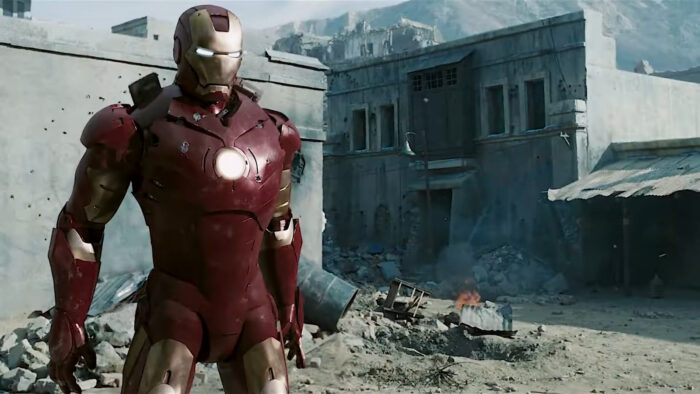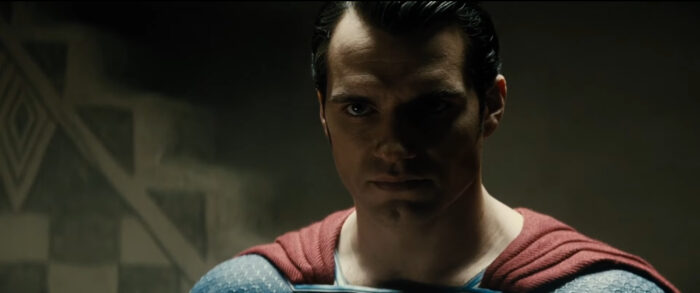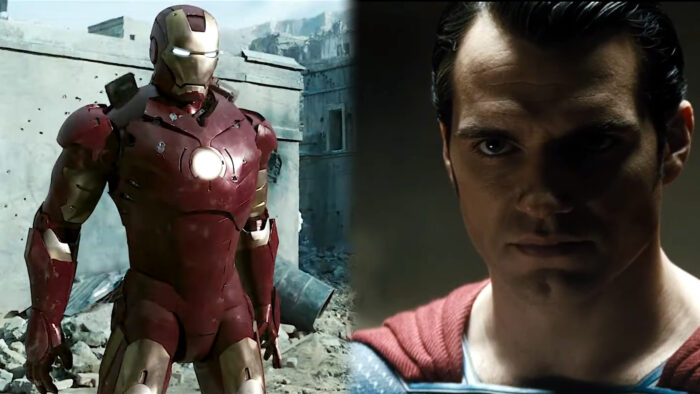How Iron Man and Superman Won and Lost in Afghanistan
What a terrible month. Let’s divert all power from political shielding to emotional thrusters: If anyone can save Americans and Afghans, it’s Iron Man and Superman.
Say what you will about the president (and I have). But that man is understandably unable to fashion an armored super-suit in a cave with a box of scraps. Only genius billionaire playboy philanthropist Tony Stark was able to build this. And in Marvel’s cinematic universe debut Iron Man (2008), years before Stark helped battle aliens and robots, he fought more grounded forces—literally, terrorists in Afghanistan.
Naturally, Stark whupped all the terrorists good, per rule-of-cool and earnest wish-fulfillment law. Iron Man and other heroes might picture idealized battle-winning. Meanwhile, Superman and other heroes show darker, more realistic reflections of consequences when even good superheroes take action in world affairs.
Iron Man vs. Ten Rings terrorists
Jon Favreau’s Iron Man updates the original Marvel series that origin-storied Tony Stark in 1963 Vietnam. Forty-five years later, Stark rides with American soldiers across the Afghan desert.1
Then: boom. One Humvee sets off a roadside IED. Brave soldiers bolt for action.
Male Soldier yells, “Jimmy, stay with Stark!”, then falls fast to enemy fire.
Fans know the rest: Tony Stark gets captured and stuck in a cave with said box of scraps. He escapes with American ingenuity, science-magic, and a noble mentor.2 On the way, we see Stark’s backstory. Again, later the MCU launched further into alien worlds. First, its heroes spent more time in places like Malibu, California, and Bagram Air Base, Afghanistan.3 Iron Man’s storytellers are telling us: This world is like the real world. Only this time, a man can build a super-suit and blast his enemies with fire (accompanied by Ramin Djawadi’s underappreciated electric guitars) before launching to the clouds.

‘There’s very little hope for these refugees’
Stark reviews the Ten Rings’s ongoing terrorism in Afghanistan. Favreau’s visceral portrayal of insurgent battles shows angry gunmen and screaming victims. Watch the scene. These days it reflects not only the late-2000s “war on terror” but today’s Afghan horrors—joyously interrupted by heroic catharsis. Stark wipes the sky with thunder, flips, and crunches into sand. Bullets can’t hurt him. His repulsor weapons hurl terrorists into walls. He’s unstoppable. He’s the invincible Iron Ma—
They grab civilians for human shields. Stark must power down his gauntlets.
Which gives him time to activate his AI. It scans the battlescape to label bad guys as HOSTILE and the innocents as CIVILIAN. Shoulder-guns flick out and go bvweermp.
Terrorists die. Civilians are saved. Stark defeats the Ten Rings-leader and blasts off.
Superman v. international law
Later, Stark faces more consequences, not from the Taliban or ISIS, but from his own military-industrial-complex guy with his own armored suit.
Yet when Superman tries similar foreign intervention, the consequences get darker.
In Zack Snyder’s Batman v Superman: Dawn of Justice (2016), Superman will later face his own industrial-complex enemy who had been operating behind the war theater. But Lex Luthor can only plot within the rules of the DC world that is much like our own, yet reflects meta-human themes. This time the nation isn’t Afghanistan, but a fictional African civil-warring country called Nairomi.4 Apart from those differences, both nations feel the same: sand, bad guys with guns, soldiers running about. But unlike Iron Man, this land offers no clear labeling and murkier moral palettes.
Lois Lane arrives in Nairomi for an interview. She asks one warring party’s general, “Are you a terrorist?” He resists the label, insisting he only fights for his people, and blames American interventionism. Watch the scene: Superman, symbol of America, naturally flies in, blasts some drones, and rushes the aspiring dictator to save Lois.

Then things get more complex. (If you’re engaging this story, you’d best watch the Ultimate Edition that restores much cinematic order lost in the theatrical edition.)
In short, Superman’s arrival complicates everything. Bad guys slaughter civilians and blame Superman. News media goes nuts. Congressional leaders hold hearings and hold Superman responsible. But this story is not about blaming Superman or challenging his ideals. It’s not even about questioning American intervention in foreign lands.5 Instead, the story reveals its own purpose in dialogue, heard by fans who have ears to hear.
‘Every act is a political act’
“I’m saying I want to understand what happened,” Lois Lane later tells her heroic lover. “I’m saying thank you for saving my life. I’m saying there’s a cost.”
There’s a cost.
“Are there any moral constraints on this person?” remarks pundit Andrew Sullivan, as himself. “We have international law. On this Earth, every act is a political act.”
On this Earth, every act is a political act.
This isn’t deconstruction of our reality. It’s deconstruction of our fantasy.
Appreciate wish-fulfillment and nobledark realism
In fantasy, a superhero can crash into a foreign land and smack the bad guys. He can save the innocents with assumed morality and science-magic, right down to using The Computers to spare CIVILIANs and easily target HOSTILEs. Without cost. Without confusing targets, provoking governments, or creating political firestorms.
In Iron Man, Tony does end up fighting a power-behind-the-power, his own rogue company man. Still, after the big reveal, Obadiah Stane isn’t morally murky. Stark’s AI might as well switch his targeting for Stane from blue CIVILIAN to red HOSTILE.
But Batman v Superman’s heroes can’t use this easy targeting system. Superman’s heroic heart and Earthly parents’ morality do give him guidance. Still, even if he acts rightly, he must face criticism and worse because every act brings a cost and every act is a political act. Superman can’t see this truth. He only knows he meant the best. Later he opens his eyes and better sees the consequences of his actions.
When the world falls apart and we long for heroes, we might follow his example.
In our case, let’s see a fuller reality that helps us appreciate both kinds of stories.
We ought not ask, “Which hero would win?” Let’s ask, “How do we need them both?”
Iron Man pictures how we feel superheroes should be able to right wrongs. That’s a good and appropriate wish that Jesus will someday fulfill. We inhabit a reality where this absolutely perfect Hero will touch down to Earth and administer perfect justice.
But until that day, Batman v Superman shows how heroes may actually confront our nobledark world. Even if we try to do good in war-torn nations, every act is political. Good guys will turn out to have been bad guys all along, or turn into bad guys—or vice-versa—or, even worse, we’ll never (this side of eternity) know who wears what label. We won’t see or foresee consequences. We’ll be trapped in no-win scenarios.
With Travis Perry, I grieve and pray for Afghanistan. I wish heroes could crash in there and save the place without consequences. Until our Hero lands on Earth, any earthly stories can only dimly reflect these heroic hopes for God’s ultimate justice.
- Timebound references include: “I don’t want to see this on your MySpace page” and flippant mentions of powerful men exploiting women. ↩
- Dr. Ho Yinsen, near death and an expected happy afterlife, accidentally quotes John Piper’s famous phrase “Don’t waste your life.” ↩
- As of this writing, that’s the very same real-world base abandoned by U.S. armed forces. ↩
- This film also features a death by a Jimmy, albeit a more famous Jimmy. ↩
- To this day I’m stunned how both the DC and Marvel film universes avoid such political entanglements—at least, as of this writing. ↩










































